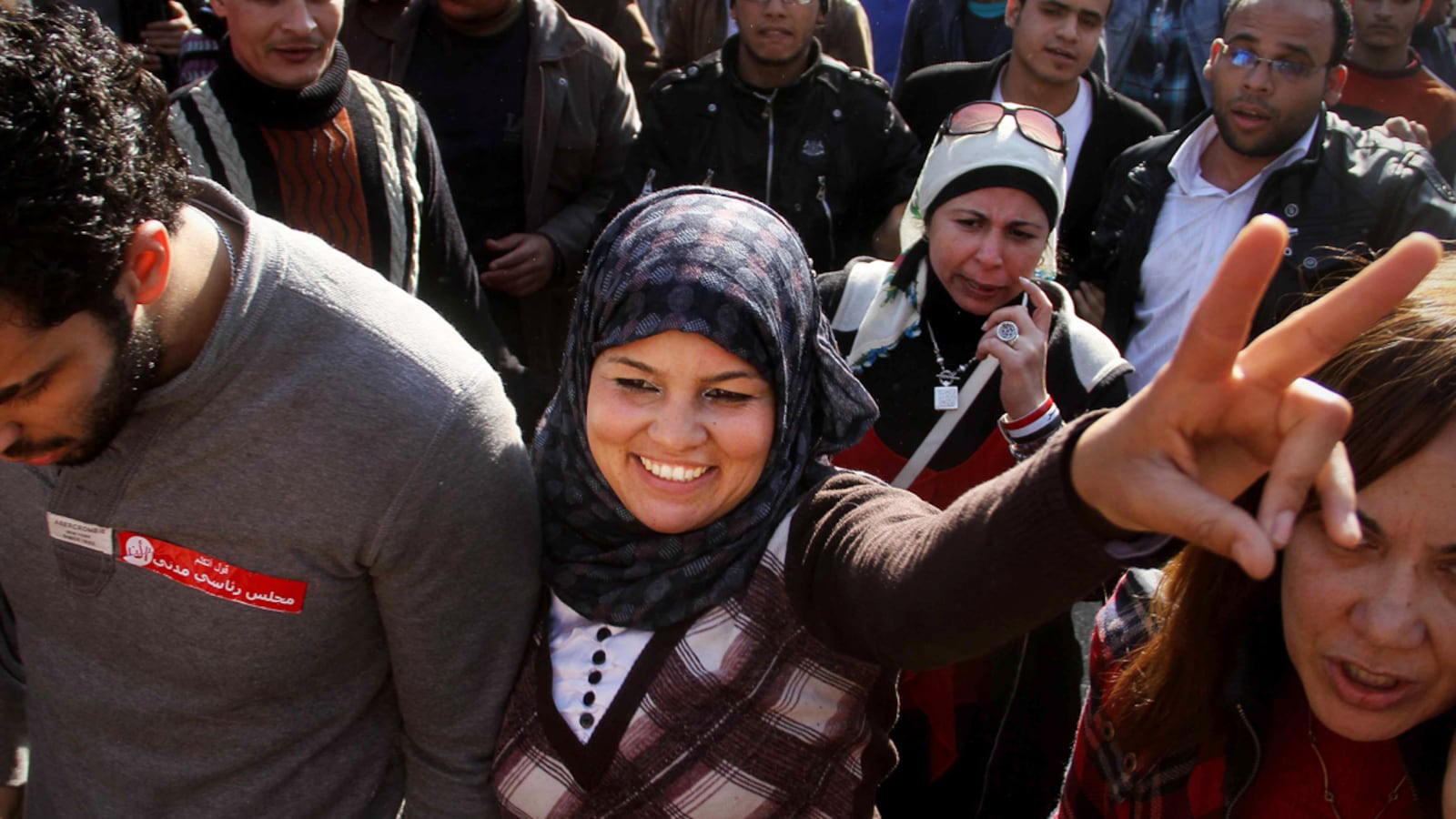A court in Egypt has forbidden the Army from carrying out so-called virginity tests on female detainees. The verdict was delivered in the case of Samira Ibrahim, a 25-year-old marketing manager and activist brave enough to defy the country’s Army.
In March of this year, military forces violently broke up a sit-in of protesters who had continued to camp out in Tahrir Square after Mubarak’s ouster. Women as well as men were arrested. According to testimony they gave to international human-rights groups, the women were insulted, accused of prostitution, beaten, and tortured. At a military camp to which they were transported, seven of the women—those who were unmarried—were subjected to “virginity tests,” stripped and inspected by a male military doctor while soldiers and officers looked on.
“On that day, I truly wished for death,” Ibrahim says in a video testimony posted online. “I kept telling myself, people get heart attacks and die, why don’t I get one?”
Ibrahim is the only one of the group to have spoken out and brought her case to court. She says she did so “because I didn’t want it to happen to anyone else.”
Ibrahim comes from the town of Sohag, in Egypt’s conservative rural South, where opinion on her case was divided: some believed the Army could never have behaved as she described, while others supported her. The young veiled woman comes from a politicized background—her father was a member in the al-Gama'a al-Islamiya, an extremist Islamist group, and has himself been arrested more than once. Ibrahim says he supported her completely in her court battle.
For many months, the Egyptian media was afraid to discuss Ibrahim’s case. The Army first denied that that any virginity tests had taken place and then, when reports began surfacing, promised an investigation into the matter that never materialized.

Eventually, members of the military council currently running the country admitted to CNN and Amnesty International that the tests took place. They said the tests were carried out to protect the Army from eventual accusations of rape by proving that the women weren’t virgins in the first place—a justification that as many have pointed out is as nonsensical as it is offensive, implying that only virgins can be the victims of rape. An unnamed Army general also told CNN that the female protesters “aren’t like your daughter or mine” because they had camped out overnight in the square with men.
Ibrahim and thousands of other Egyptian women participated in the revolution from its beginning. Human-rights activists say the Army used sexual humiliation as a form of punishment and intimidation against female protesters.
“It’s just humiliation, they’re breaking you,” says Ibrahim in her video testimony. “So you don’t even think of asking for Egypt’s rights.”
The court agreed. “The examinations involved the purposeful degradation and humiliation of women participating in protests,” the court verdict reads.
But Egyptian courts don’t have jurisdiction over military personnel. “It’s the most significant legal obstacle we’re facing right now for obtaining accountability for any victim of military abuse,” says Hossam Bahgat, director of the Egyptian Initiative for Personal Rights, which along with other human-rights and legal-aid organizations helped Ibrahim bring her case to court.
Ibrahim was forced to take her case to an administrative court to challenge the practice of virginity tests generally rather than to bring charges against the individuals who ordered them and carried them out.
Still, today’s verdict is “significant as a step towards restoring Ibrahim’s rights and those of other woman subjected to this intrusive, abusive practice,” says Bahgat. “The wording of the decision is also extremely important—this is the harshest condemnation to come out of an Egyptian court against the armed forces.”
The court makes it clear that it holds the Supreme Council of the Armed Forces responsible for the practice and states that “those individuals responsible for the practice and belonging to the armed forces committed a crime with no statute of limitations.”
An Army spokesman responded to today’s verdict by denying, once again, that the Army carries out virginity tests. Yet after months of stonewalling on the case, military prosecutors have suddenly announced they will be trying an Army doctor next week. But they are only charging him with public indecency and violation of orders, implying that what happened is “one Army doctor going too far and acting on his own initiative,” says Bahgat, a scenario that is “laughable and not believable.”
After the outrage over last week’s footage of soldiers dragging and beating a veiled female protester, the “virginity tests” case comes as further evidence of the Egyptian Army’s war on women. Ibrahim’s example may inspire others to fight back.






